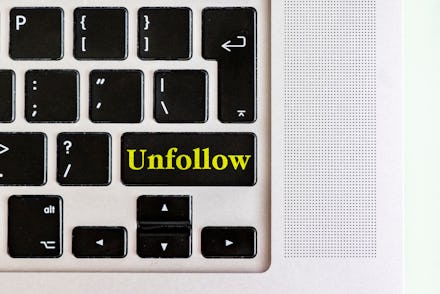Why muting your friend who posts way too many Insta Stories feels so good

Ever since Tidying Up with Marie Kondo premiered on Netflix, people far and wide have become obsessed with decluttering their homes, using Kondo’s now-famous KonMari method to discard anything that doesn’t “spark joy.” As Kondo previously told Mic, the process can do wonders for your happiness, and it can be applied to more than just physical belongings, like your finances and career. And then there’s your social media feeds which — if you follow a large number of people — present a solid opportunity for whittling down, by unfollowing or muting accounts you no longer need in your life.
Much like collecting a closet full of clothes that sparked joy when you bought them, it may have felt good to initially hit the “follow” button on a big celebrity, an influencer who posts tempting product and lifestyle inspiration, or an acquaintance you wanted to keep tabs on. But loading up your Instagram or Twitter feed can also quickly turn toxic. “The idea of pulling in lots of friends on social media seems positive and innocent enough, but the deceiving aspect is that your friend group is a group that you only know at often a very superficial level,” said clinical psychologist Joshua Klapow, PhD. “Once you get past immediate family and people you have regular face-to-face contact with, you are getting yourself into a universe that is created to present in a very specific light….[And], as your social circle grows larger and larger and you get further and further from those who you know at a more personal level, the opportunity for speculation, miscommunication, misunderstanding and the sharing of misinformation grows and grows.”
In fact, multiple studies have found social media can take a real toll on mental health, negatively impacting self-esteem and even increasing the likelihood of depression. Plus, Klapow noted, taking in countless posts by other people — whether they’re positive or negative — requires a significant investment of your time and energy. “The larger your [social media] circle, the more apt you will be to spend more time processing the posts,” he said. “Even if you feel ‘fine,’ the amount of time and cognitive resources you spend can take away from other aspects of your life — [like] time spent talking to family, friends [and] community, [and] time spent connecting in a more personal manner. …[And], you may not have the emotional or psychological bandwidth to interact outside of social media as much if social media is dominating your energy.”
So, Klapow said, if you’re not benefiting from following a particular account or it’s triggering negativity for you, go ahead and mute or unfollow. Chances are you’ll feel pretty good once you do. “We feel better after unfollowing or muting because we have remedied a source of distress and a source of anticipatory anxiety,” Klapow said. “If we are dreading looking at our feed because of a potential post that makes us distressed, then we are simply wasting our emotional bandwidth. The removal of this person from our feed is essentially removing a source of stress, which allows us to calm down, relax and not worry about what might appear in the feed.”
And if you’re hesitant to hit that unfollow button because of what the person might think should they notice the change, Klapow encourages you to consider the reason you’re taking this action in the first place. “If you are distressed, angry [or] uninterested about their posts to the point where you feel it is better to unfollow them, then how much do you care directly about what they think about you unfollowing?” he said. “If you are moved to unfollow, then something is driving your emotions strong enough to take that action. And if you feel strongly enough to do that, then whatever level of social media ‘rudeness’ is implied...isn’t stronger than the distress you feel from their posts. Your emotional well-being is more important than your social media reputation.”